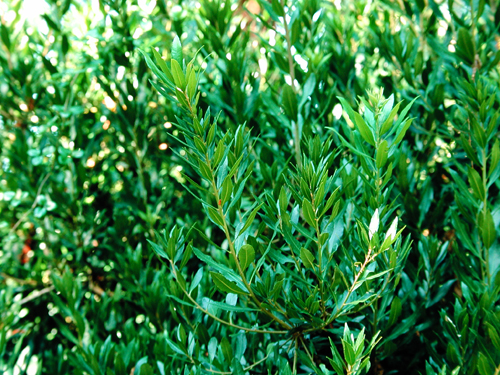Morella californica
California wax myrtle

© Great Plant Picks
Synonyms:
Outstanding Qualities
Morella californica (previously Myrica californica) is also called California wax myrtle or California bayberry. It is an easy-to-grow medium-sized shrub that can be used in formal or naturalistic gardens. It can be sheared to produce hedges or other geometric shapes, or it can be left to grow into large, loose mounds, providing a background to other shrubs and perennials. Its small, evergreen, leaves are aromatic when crushed. Clusters of black fruit are held on short spurs in late summer, persisting into midwinter and providing food for wild birds. For a naturalistic buffer plant it with Calocedrus decurrens, Oxydendrum arboreum and Pinus parviflora 'Glauca'.
Quick Facts
Plant Type: shrub
Foliage Type: evergreen
Plant Height (10-year): 10 ft. 0 in. (3.05 meters)
Plant Width/Spread (10-year): 10 ft. 0 in. (3.05 meters)
Plant Height-Mature: 15 ft. 0 in. (4.57 meters)
Plant Width-Mature: 15 ft. 0 in. (4.57 meters)
Hardiness: USDA Zones 7 to 9
Sun/Light Exposure: full sun to deep shade
Water Requirements: drought tolerant once established
Wildlife Associations: birds
Resistant to: deer
Culture Notes
California wax myrtle grows well in full sun to deep shade. The more sun it receives the denser the growth. It prefers a location with moist to well-drained soil, but will tolerate sand and clay. Once established it is completely drought tolerant. It responds well to pruning and will tolerate shearing. Heavy pruning is best done in the late winter with shaping in early to mid summer. It can be limbed up as a small tree over time.
Geek Notes
Genus name changed Jan 2006 per David Mabberley
Text and photos ©2020 Great Plant Picks/Elisabeth Carey Miller Garden except where otherwise noted
Funded by the Pendleton and Elisabeth Carey Miller Charitable Foundation, The Seattle Times, and Individual Donors
Administered by the Elisabeth Carey Miller Botanical Garden

